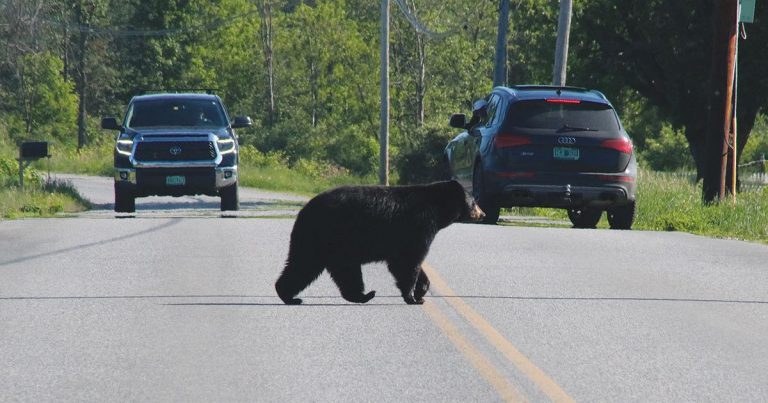A hit and run collision between a vehicle and a black bear on Mountain Road last weekend has sparked a renewed discussion around town policies, with activists calling on the town to pass new laws aimed toward preventing similar incidents.
On Saturday morning, a Stowe resident witnessed a car hit a mother bear attempting to cross Mountain Road near Fiddler’s Green Inn and the Matterhorn restaurant at the bottom of Harlow Hill where the speed limit shifts from 50 mph to 40.
The witness, who reached out to Brenna Galdenzi, president of Protect Our Wildlife and a Stowe resident, said that two bear cubs ran up a nearby tree.
The witness told Galdenzi she was frustrated by repeated attempts to reach out to law enforcement and Vermont Fish and Wildlife in the immediate aftermath of the collision, though Morristown warden Ethan Coffey said he investigated the nearby area for evidence of the injured bear or the cubs.
While Galdenzi said it’s unclear whether the mother bear survived, she believed it was unlikely due to the high rate of speed the car was likely traveling.
Coffey said he searched the area but found no evidence of a dead bear and noted that black bears are “resilient” and posited that the bear very well may have survived.
Galdenzi is calling on Stowe residents to keep their eyes and ears out for the potentially motherless cubs. If found, Protect Our Wildlife will arrange for their transportation to a bear rehabilitation facility in New Hampshire.
This is not the first time a vehicle collision with a bear has been reported in Stowe this year. Another incident was reported to police on May 30, and five different incidents involving black bears were reported to Stowe police between June 22 and 29, including one where bears trashed a residence near Topnotch after entering through an open window.
Galdenzi also reached out to town officials in early June, according to emails she provided to the Stowe Reporter, specifically pointing out how the Matterhorn’s dumpsters were inadequately equipped to protect against rummaging bears, and that the dumpsters were reportedly attracting “a mama bear and two cubs” to the area on a daily basis.
Catherine Gott, vice chair of the Stowe Conservation Commission, also looked into the situation at the Matterhorn and provided photo evidence of the restaurant’s dumpster situation. She responded to Galdenzi’s email and said she hoped the commission could investigate some proactive steps that could be taken to help businesses more adequately bear-proof their dumpsters.
Todd Krueger, a Matterhorn employee, said their dumpsters were set up under the guidance of the Department of Fish and Wildlife, but acknowledged that the restaurant has been affected by a rampant bear problem. The restaurant is currently looking at installing a fence, electrical or otherwise, to help deter further dumpster foraging.
In the wake of this most recent bear collision, Galdenzi called on the town to “help businesses upgrade their current trash management systems, whether that’s fundraising, increasing meals and rooms taxes” or something else.
She said Protect Our Wildlife offered to help the Matterhorn but didn’t have the budget to ensure all the dumpsters in Stowe were adequately protected against roving bears.
“Expecting businesses to make this a priority without incentive won’t happen,” she wrote in an email. “This will only work if it’s a community-embraced effort. If 10 restaurants are all acting responsibly, but one isn’t, that will cause problems for everyone else.”
Galdenzi also supported lowering the speed limit in that section of Mountain Road or installing a wildlife crossing sign.
Town manager Charles Safford noted that the section of road where the bear was hit is a state-controlled highway so it would be up to them to add signs or lower the speed limit.
But Safford has tentatively added the subject of bear proofing dumpsters to the agenda for the selectboard’s Aug. 8 meeting. He also noted that while the town has focused on education around bear-related issues, it has also installed bear-proof trash receptacles in Stowe’s public parks and directed assistant public works director Chris Jolly to research the cost and availability of bear-proof dumpsters.
“I don’t want to put more pressure on restaurants,” Galdenzi said. “I know that a lot of them are struggling to stay open, so we can’t expect them to make this a priority. We need to make it easier for them to do the right thing and easier means helping to subsidize.”
Galdenzi is also calling for a number of other possible policies that she said would make Stowe safer for black bears, including more consistent year-round outreach around best practices for bear safety for part-time Stowe residents and short-term renters and fines for people who leave up birdfeeders all year round despite warnings from the Department of Fish and Wildlife to take them down during the spring and summer.
“Does Stowe want to be known as the resort town that kills bears?” Galdenzi asked. “With all of our money and our resources and our knowledge, can’t we figure out a way to do better?”




